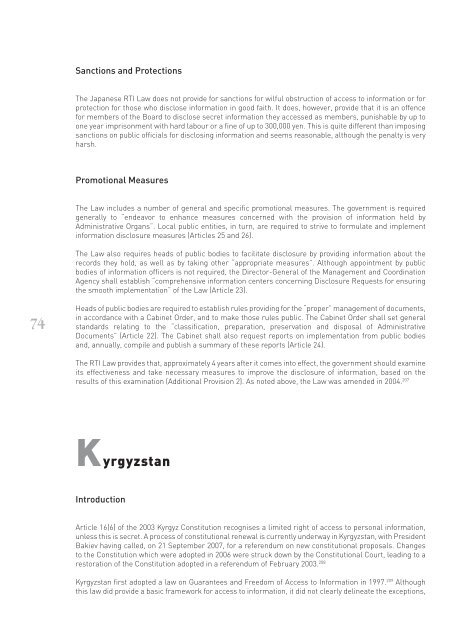Freedom of Information: A Comparative Legal Survey - Federation of ...
Freedom of Information: A Comparative Legal Survey - Federation of ...
Freedom of Information: A Comparative Legal Survey - Federation of ...
You also want an ePaper? Increase the reach of your titles
YUMPU automatically turns print PDFs into web optimized ePapers that Google loves.
74<br />
Sanctions and Protections<br />
The Japanese RTI Law does not provide for sanctions for wilful obstruction <strong>of</strong> access to information or for<br />
protection for those who disclose information in good faith. It does, however, provide that it is an <strong>of</strong>fence<br />
for members <strong>of</strong> the Board to disclose secret information they accessed as members, punishable by up to<br />
one year imprisonment with hard labour or a fi ne <strong>of</strong> up to 300,000 yen. This is quite different than imposing<br />
sanctions on public <strong>of</strong>fi cials for disclosing information and seems reasonable, although the penalty is very<br />
harsh.<br />
Promotional Measures<br />
The Law includes a number <strong>of</strong> general and specifi c promotional measures. The government is required<br />
generally to “endeavor to enhance measures concerned with the provision <strong>of</strong> information held by<br />
Administrative Organs”. Local public entities, in turn, are required to strive to formulate and implement<br />
information disclosure measures (Articles 25 and 26).<br />
The Law also requires heads <strong>of</strong> public bodies to facilitate disclosure by providing information about the<br />
records they hold, as well as by taking other “appropriate measures”. Although appointment by public<br />
bodies <strong>of</strong> information <strong>of</strong>fi cers is not required, the Director-General <strong>of</strong> the Management and Coordination<br />
Agency shall establish “comprehensive information centers concerning Disclosure Requests for ensuring<br />
the smooth implementation” <strong>of</strong> the Law (Article 23).<br />
Heads <strong>of</strong> public bodies are required to establish rules providing for the “proper” management <strong>of</strong> documents,<br />
in accordance with a Cabinet Order, and to make those rules public. The Cabinet Order shall set general<br />
standards relating to the “classifi cation, preparation, preservation and disposal <strong>of</strong> Administrative<br />
Documents” (Article 22). The Cabinet shall also request reports on implementation from public bodies<br />
and, annually, compile and publish a summary <strong>of</strong> these reports (Article 24).<br />
The RTI Law provides that, approximately 4 years after it comes into effect, the government should examine<br />
its effectiveness and take necessary measures to improve the disclosure <strong>of</strong> information, based on the<br />
results <strong>of</strong> this examination (Additional Provision 2). As noted above, the Law was amended in 2004. 207<br />
K yrgyzstan<br />
Introduction<br />
Article 16(6) <strong>of</strong> the 2003 Kyrgyz Constitution recognises a limited right <strong>of</strong> access to personal information,<br />
unless this is secret. A process <strong>of</strong> constitutional renewal is currently underway in Kyrgyzstan, with President<br />
Bakiev having called, on 21 September 2007, for a referendum on new constitutional proposals. Changes<br />
to the Constitution which were adopted in 2006 were struck down by the Constitutional Court, leading to a<br />
restoration <strong>of</strong> the Constitution adopted in a referendum <strong>of</strong> February 2003. 208<br />
Kyrgyzstan fi rst adopted a law on Guarantees and <strong>Freedom</strong> <strong>of</strong> Access to <strong>Information</strong> in 1997. 209 Although<br />
this law did provide a basic framework for access to information, it did not clearly delineate the exceptions,
















